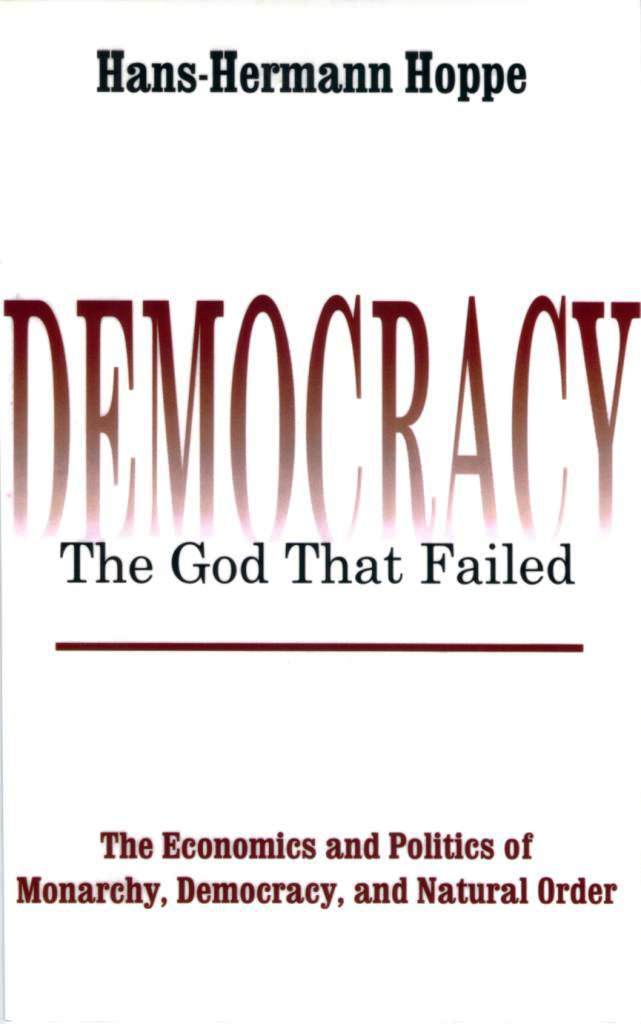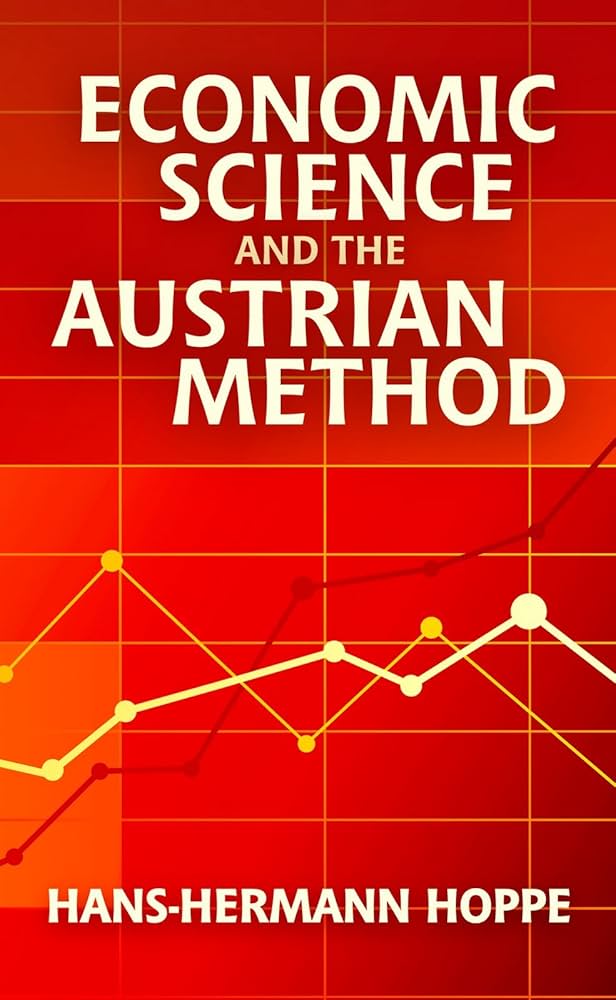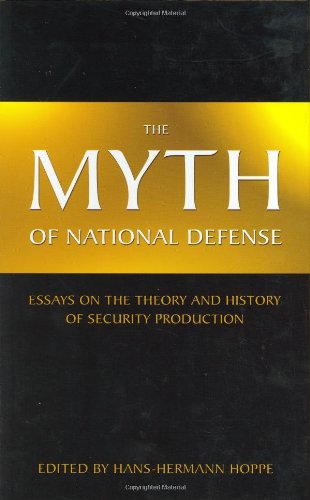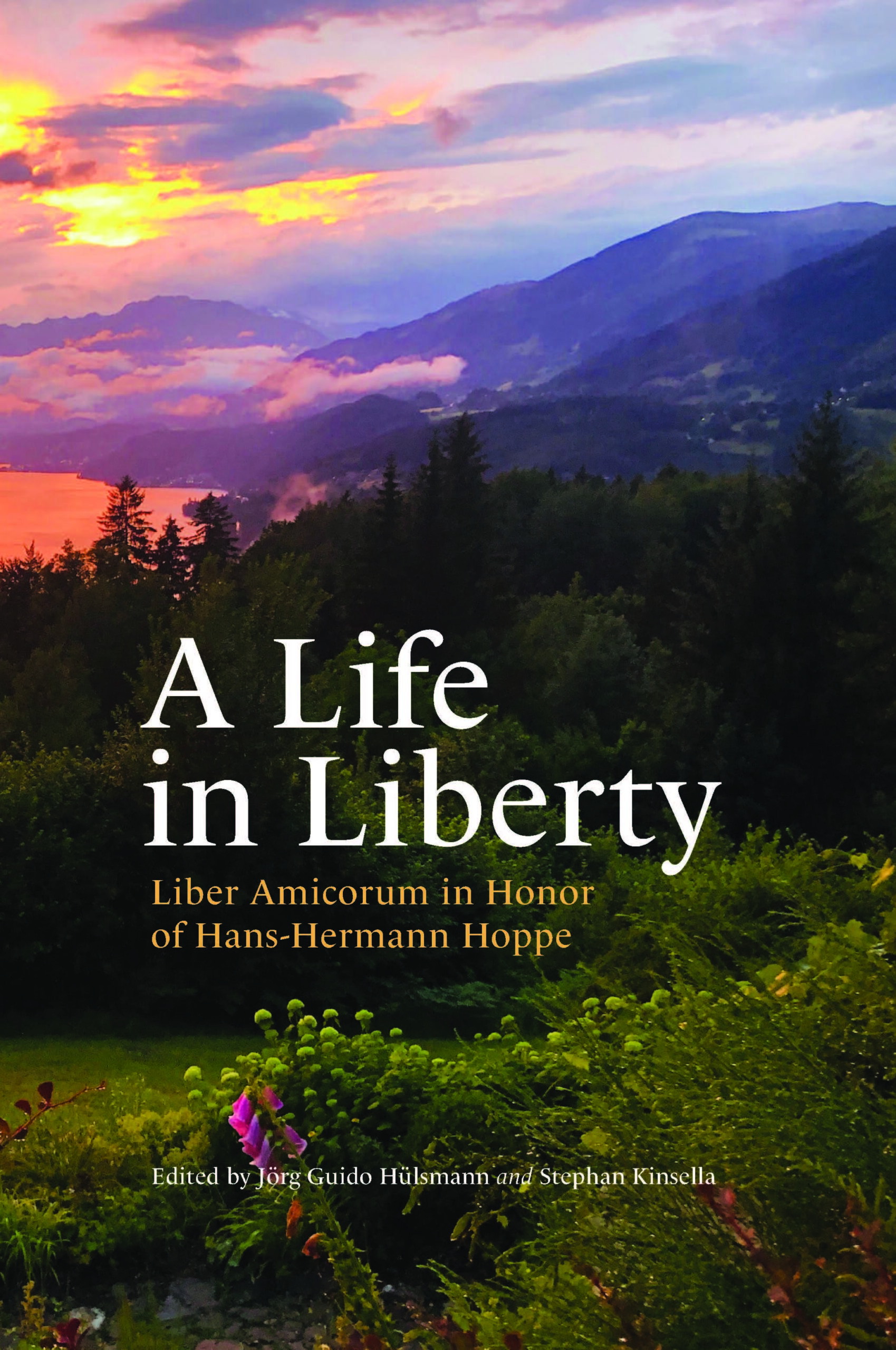The following is a video of Prof. Hoppe speaking at the Ludwig von Mises Seminar 2015 of Mises Institut Deutschland “Der Staat”.
A Portugese translation of F.A. Hayek on Government and Social Evolution: A Critique (RAE, Vol. 7 Num. 1), is available here as F. A. Hayek sobre Governo e Evolução Social – Uma Crítica. The text is below: [continue reading…]
A Portugese translation of “The Justice of Economic Efficiency,” Austrian Economics Newsletter, Vol. 9, No. 2 (Winter 1988), also included in The Economics & Ethics of Private Property, is available here, as A Justiça da Eficiência Econômica. The text is below as well:
Professor Hoppe’s introduction to Murray Rothbard’s The Logic of Action (One, Two) (1997) is available here: PDF. For other incisive explorations of Rothbard’s thought, see Professor Hoppe’s Introduction to The Ethics of Liberty and his obituary in this collection.
N.b.: The Logic of Action is no longer available online, but Economic Controversies, a later version containing virtually all of the material of The Logic of Action plus additional material, is available online.
A Chinese translation of Fallacies of the Public Goods Theory and the Production of Security (JLS, Vol. 9 Num. 1) is now available as: “第一章 公共财货理论的谬误 与安防生产 .” It is available in PDF here.
Below is David Gordon’s introductory essay to Professor Hoppe’s recently published monograph From Aristocracy to Monarchy to Democracy.
Published at Mises Daily.
***
Hoppe on Democracy, Progress, and the State
[This is David Gordon’s introductory essay to Hans-Hermann Hoppe’s new book From Aristocracy to Monarchy to Democracy.]
Hans-Hermann Hoppe is a master of theoretical history. He tells us that
it is not my purpose here to engage in standard history, i.e., history as it is written by historians, but to offer a logical or sociological reconstruction of history, informed by actual historical events, but motivated more fundamentally by theoretical — philosophical and economic — concerns.
The work of Carl Menger and Ludwig von Mises on the commodity origin of money is a prime example of what Hoppe has in mind.
In carrying out his illuminating project, Hoppe finds himself in opposition to the dominant way of looking at the evolution of government. According to this perspective, government has over the centuries become ever more democratic. Rule by the people is the final form of government; once it has been reached, history, at least as far as government is concerned, has ended. This historical movement, further, is a “good thing.” It is the triumph of freedom. History is the story of progress. [continue reading…]
Professor Hoppe’s introduction to the 1998 edition of Murray Rothbard’s The Ethics of Liberty is appended below. (Internet archive version; local pdf; Mises Daily version; audio version: Part 1, 2).
See also David Gordon, “Private Property’s Philosopher,” Mises Review (April 1, 1999), in An Austro-Libertarian View: Essays by David Gordon, vol. II.
INTRODUCTION
By Hans-Hermann Hoppe
IN AN AGE OF intellectual hyperspecialization, Murray N. Rothbard was a grand system builder. An economist by profession, Rothbard was the creator of a system of social and political philosophy based on economics and ethics as its cornerstones. For centuries, economics and ethics (political philosophy) had diverged from their common origin into seemingly unrelated intellectual enterprises. Economics was a value-free “positive” science, and ethics (if it was a science at all) was a “normative” science. As a result of this separation, the concept of property had increasingly disappeared from both disciplines. For economists, property sounded too normative, and for political philosophers property smacked of mundane economics. Rothbard’s unique contribution is the rediscovery of and philosophy, and the systematic reconstruction and conceptual integration of modern, marginalist economics and natural-law political philosophy into a unified moral science: libertarianism. [continue reading…]

Newly released by the Mises Institute: From Aristocracy to Monarchy to Democracy. PDF and epub links below. A related speech is linked below as well.
Note: The copyright to this work is held by Hans-Hermann Hoppe, who hereby releases and licenses this work with a Creative Commons Attribution 4.0 License, despite any notice to the contrary on the published version.
[Update: David Gordon’s introductory essay is available at “Hoppe on Democracy, Progress, and the State”: Introductory Essay to From Aristocracy to Monarchy to Democracy.]
A Tale of Moral and Economic Folly and Decay
In this tour de force essay, Hans-Hermann Hoppe turns the standard account of historical governmental progress on its head. While the state is an evil in all its forms, monarchy is, in many ways, far less pernicious than democracy. Hoppe shows the evolution of government away from aristocracy, through monarchy, and toward the corruption and irresponsibility of democracy to have been identical with the growth of the leviathan state. There is hope for liberty, as Hoppe explains, but it lies not in reversing these steps, but rather through secession and decentralization. This pocket-sized, eye-opening monograph is ideal for sharing with friends. It can revolutionize the way a reader sees society and the state.
From Aristocracy to Monarchy to Democracy
The following is a video of Prof. Hoppe speaking at the Rafael del Pino Foundation’s Master Lecture Series in Madrid, Spain, on June 20, 2013: “From Aristocracy to Monarchy to Democracy: A Tale of Moral and Economic Folly and Decay.”
Several Polish translations of Hoppe articles are available at the Polish Ludwig von Mises Institute (www.mises.pl), which are compiled here. The listings include also other materials such as the video noted below. A Polish translation of Professor Hoppe’s A Theory of Socialism and Capitalism is also forthcoming in Dec. 2014-Jan 2015 from the Polish Mises Institute, under the title „Teoria Socjalizmu i Kapitalizmu.”
Społeczeństwo prawa państwowego czy prywatnego? (video) – Society based on the public or the private law?
 Professor Hoppe’s monograph The Private Production of Defense has been translated into Chinese, as 防卫的私人生产. It is available in PDF here.
Professor Hoppe’s monograph The Private Production of Defense has been translated into Chinese, as 防卫的私人生产. It is available in PDF here.
Professor Hoppe’s latest publication is the article “A Realistic Libertarianism,” LewRockwell.com (Sept. 30, 2013), which served as a basis for a speech at the recently-concluded 2014 Annual Meeting of the Property and Freedom Society (see below).
A German translation of The Ethics of Entrepreneurship and Profit (LewRockwell.com, June 23, 2014) is now available in Eigentuemlich Frei, pp. 44-49.
An online version of Professor Hoppe’s paper “L’Europe De L’Apres-Communisme: Émigration, Integration Et Balkanisation,” traduit par Jakob Arfwedson, with a Foreword by Henri Lepage (Paris: Institut Euro 92, 1993) is now available in HTML here; also in pdf; doc.
This paper appears to be a French translation of an Italian version, “Migrazione, centralism secessione nell’Europa e contemporanea,” Biblioteca della Libertà n. 118, July-September 1992 (“Migration, centralism and Secession in Contemporary Europe”). Pascal Salin’s response thereto is appended below. For a similar English version, see “The Economic and Political Rationale for European Secessionism,” in David Gordon, ed., Secession, State & Liberty(Transaction, 1998), online here.
[continue reading…]
Professor Hoppe’s essay, “The Economic and Political Rationale for European Secessionism,” in David Gordon, ed., Secession, State & Liberty (Transaction, 1998), is available online.
 Professor Hoppe’s monograph Kritik der kausalwissenschaftlichen Sozialforschung: Untersuchungen zur Grundlegung von Soziologie und Ökonomie [Critique of Causal Scientific Social Sesearch: Studies on the Foundation of Sociology and Economics] (Opladen: Westdeutscher Verlag, 1983) has been reformatted by François Guillaumat. This version is cleaner than the original and has endnotes converted to footnotes (doc; pdf; original version). A continually-updated doc version is available here.
Professor Hoppe’s monograph Kritik der kausalwissenschaftlichen Sozialforschung: Untersuchungen zur Grundlegung von Soziologie und Ökonomie [Critique of Causal Scientific Social Sesearch: Studies on the Foundation of Sociology and Economics] (Opladen: Westdeutscher Verlag, 1983) has been reformatted by François Guillaumat. This version is cleaner than the original and has endnotes converted to footnotes (doc; pdf; original version). A continually-updated doc version is available here.
An English translation is available at Hoppe’s Habilitation Thesis: Critique of Causal Scientific Social Research.
A Portugese translation of Democracy: The God That Failed, is now available. The English translation of Professor Hoppe’s Preface to the Portugese edition is available here.

 An Italian translation of Economic Science and the Austrian Method (1995) has appeared, translated by Luigi Pirri, and an introduction by Piero Vernaglione.
An Italian translation of Economic Science and the Austrian Method (1995) has appeared, translated by Luigi Pirri, and an introduction by Piero Vernaglione.
Latest publication: The Ethics of Entrepreneurship and Profit, LewRockwell.com (June 23, 2014)
Reflections on State and War By Hans-Hermann Hoppe
Making the World Safe from Democracy or: How to Defend Oneself Against the United States
After this excursion into the theory of democratic peace I am back to the proposition that there is no greater threat to lasting peace than the democratic state, and in particular the United States. Thus, the question: how to make the world safe from democracy or how to defend oneself against the U.S..
Making the World Safe from Democracy or: How to Defend Oneself Against the United States












